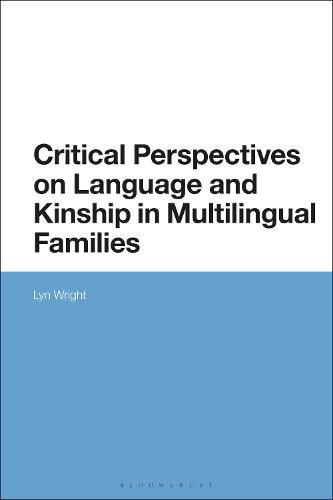Readings Newsletter
Become a Readings Member to make your shopping experience even easier.
Sign in or sign up for free!
You’re not far away from qualifying for FREE standard shipping within Australia
You’ve qualified for FREE standard shipping within Australia
The cart is loading…






Applying critical kinship perspectives to the study of multilingual families, this book foregrounds family formation processes, gender, and sexuality in examinations of language use. Focusing on historically marginalized families (such as single parent, adoptive, and LGBTQ+), the analyses draw on data from private and public spheres including interviews and recorded interactions in homes, as well as memoirs, documentaries, news media, and even comedy. Lyn Wright addresses questions such as why single parents might be better at raising bilingual children, how multilingualism plays a role in constructing shared histories in adoptive families, and what translingual resources allow LGBTQ+ families to negotiate gender roles and family relationships. In addition, she examines the construction of monolingual, nuclear family norms in public discourse that potentially constrain families’ everyday multilingual identities.
Integrating related fields of family discourse, family language socialization, and family language policy unifies ways of understanding the intersections of kinship and language. The analyses in this book provide insight into multilingual family experiences, children’s language development, and societal level language maintenance and shift.
$9.00 standard shipping within Australia
FREE standard shipping within Australia for orders over $100.00
Express & International shipping calculated at checkout
Applying critical kinship perspectives to the study of multilingual families, this book foregrounds family formation processes, gender, and sexuality in examinations of language use. Focusing on historically marginalized families (such as single parent, adoptive, and LGBTQ+), the analyses draw on data from private and public spheres including interviews and recorded interactions in homes, as well as memoirs, documentaries, news media, and even comedy. Lyn Wright addresses questions such as why single parents might be better at raising bilingual children, how multilingualism plays a role in constructing shared histories in adoptive families, and what translingual resources allow LGBTQ+ families to negotiate gender roles and family relationships. In addition, she examines the construction of monolingual, nuclear family norms in public discourse that potentially constrain families’ everyday multilingual identities.
Integrating related fields of family discourse, family language socialization, and family language policy unifies ways of understanding the intersections of kinship and language. The analyses in this book provide insight into multilingual family experiences, children’s language development, and societal level language maintenance and shift.